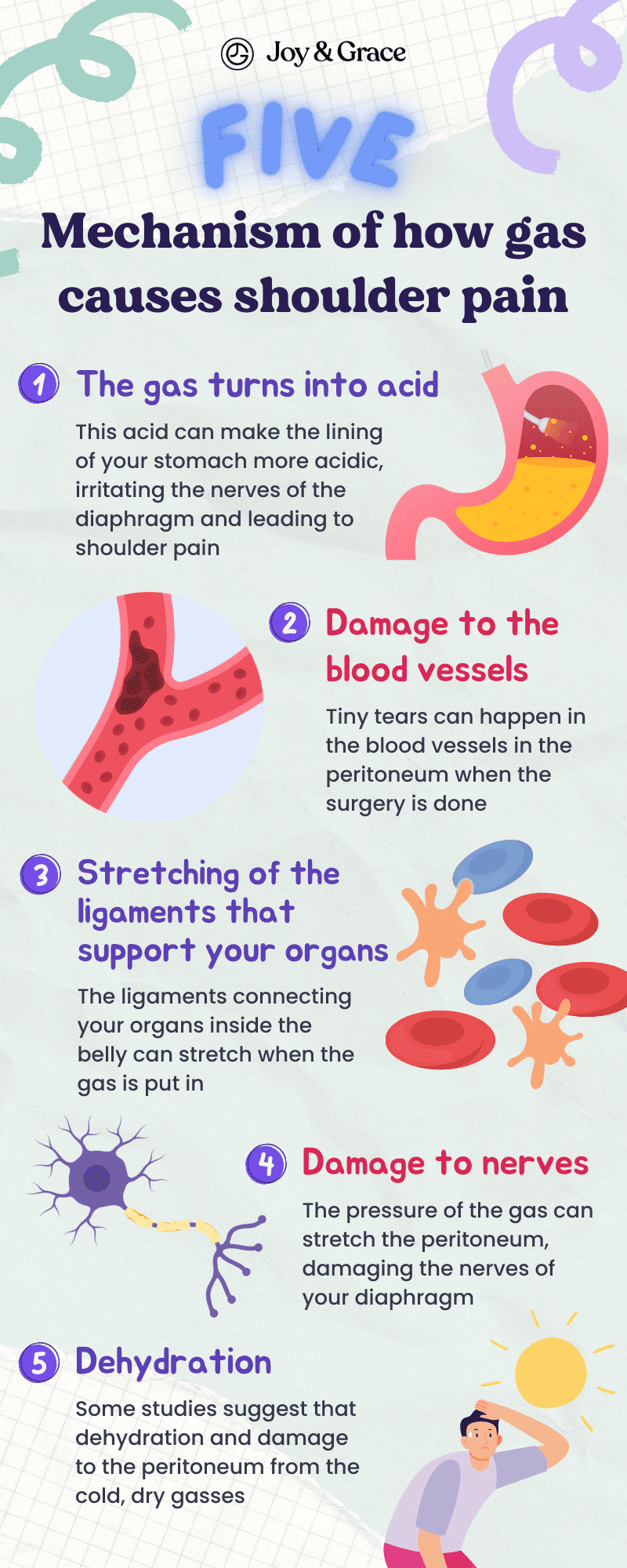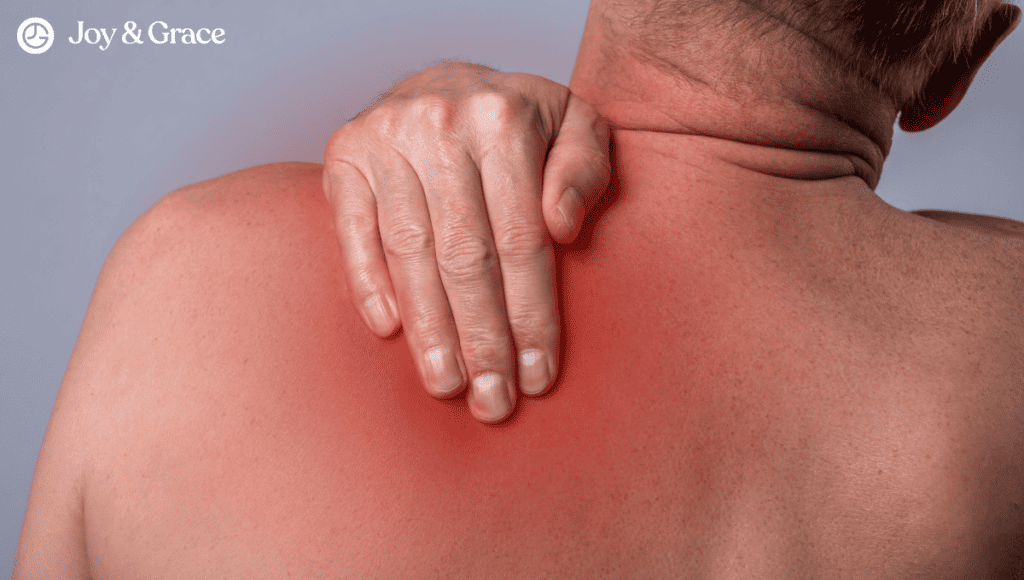Experiencing gas pain in the shoulder after surgery is more common than you might think, and trust us, it's not your imagination playing tricks. If you've undergone abdominal or laparoscopic surgery, your chances of encountering this discomfort are real.
But why does it happen? Even more importantly, how can you find relief? This article will explore the causes of post-surgery gas pain in the shoulder and provide some helpful tips to ease your discomfort. After all, your journey to recovery shouldn't be marred by unexpected aches and pains.
Can Surgery Cause Gas Pain In My Shoulder?
Surprisingly, surgery can indeed cause gas pain in your shoulder.
This is a common but less known side effect of laparoscopic surgeries and abdominal surgeries. A study shows up to 68% of patients can experience shoulder pain after laparoscopic surgery.
And this percentage can change depending on the type of surgery.
According to 2020 study, shoulder pain can occur in:
- 63% of patients who underwent laparoscopic cholecystectomy (removal of the gallbladder)
- 66% of patients who had laparoscopic gastric band surgery (performed for weight loss)
- 83% of patients who underwent laparoscopic gynecological surgery, such as a hysterectomy (removal of the uterus)
The discomfort is typically due to the insufflation gas used to inflate the abdomen during these procedures. During a laparoscopy, doctors insert a laparoscope (a small tube with a light on the end) into a small cut in your abdomen.
They often inflate the abdomen with a harmless gas, usually carbon dioxide. This is done to create more working space and enhance visibility. Once the procedure finishes, most of this gas is removed, but some may remain trapped inside, causing pressure and pain.
Interesting, right? There's more beneath the surface. Let's unfold the details together.
Why Do I Feel Gas Pain In My Shoulder After Surgery?

The gas pain is typically felt in your abdomen, which may feel like cramping or bloating abdominal pain. However, the gas can also cause pain in your shoulder due to a phenomenon called referred pain. The main player behind this mechanism is the diaphragm, the muscle that helps you breathe.
Here’s how it happens:
Anatomically, a nerve in your diaphragm also connects with a nerve in your shoulder along its pathway. Specifically, these are the phrenic and supraclavicular nerves. The phrenic nerve in the diaphragm, irritated by the presence of leftover gas, is linked to the supraclavicular nerve in the shoulder. This causes your brain to feel pain in your shoulder even though it comes from the abdomen.
Furthermore, the lining of your abdomen (peritoneum) is also connected to a portion of the diaphragm. Because of this, the nerves of the diaphragm may be irritated when the peritoneum is stretched.
You may also experience neck pain as the phrenic nerve comes from the spinal nerves in your neck.
In essence, your body's network of nerves intertwines with your shoulder and abdomen, making your shoulder feel the aftereffects of abdominal gas. Quite a fascinating interplay, isn't it?
How Does Gas Cause Shoulder Pain?

Now that we’ve touched on referred pain, let’s talk about how the gas affects your diaphragm and causes shoulder pain.
According to researchers, the gas used during surgery can cause shoulder pain through the following mechanisms:
- The gas turns into acid
The carbon dioxide used in the surgical procedure can turn into carbonic acid inside your body. This acid can make the lining of your stomach more acidic, irritating the nerves of the diaphragm and leading to shoulder pain.
If residual carbon dioxide gas is washed away or removed, the frequency or intensity of postoperative pain will be reduced.
- Damage to the blood vessels
Another possibility is that tiny tears can happen in the blood vessels in the peritoneum when the surgery is done. These tears can cause inflammation, and the pain can spread from the peritoneum to the shoulder.
- Stretching of the ligaments that support your organs
Another theory is that the ligaments connecting your organs inside the belly can stretch when the gas is put in. This stretching can cause pain and may be related to your body’s position and the amount of gas left in your belly.
- Damage to nerves
The pressure of the gas can also stretch the peritoneum, damaging the nerves of your diaphragm.
- Dehydration
Some studies suggest that dehydration and damage to the peritoneum from the cold, dry gases used in the surgery can also cause pain, but there is less evidence for this theory.
Can Gas Cause Severe Shoulder Pain?
Yes, the gas from surgery can cause severe pain in the shoulder. According to a study, shoulder pain after laparoscopic surgery is most severe 24 hours after surgery. The pain is also more severe in the right shoulder than in the left.
To be specific, the gas pain in the shoulder after surgery may feel like:
- A sharp, stabbing sensation
- Pain that can worsen when breathing or moving around
- Pain that can radiate to the neck
How Long Does Gas Pain Last After Laparoscopy?
Typically, gas pain dissipates as the body gradually absorbs the residual gas, which can take anywhere from a few hours to several days post-surgery.
Typically, this discomfort can last for 1 to 2 days after surgery. However, according to a study, shoulder pain from a laparoscopic procedure may persist for 1 week or up to 5 weeks after surgery.
What Helps Gas Pain In My Shoulder After Surgery?

Here are some ways you can relieve gas pain in your shoulder after surgery:
- Walk Around:
One of the simplest ways to relieve gas pain in your shoulder is by standing up and moving around. Walking encourages the passage of gas through your system, bringing relief.
In one case report, the patient’s shoulder pain was relieved after sitting up or standing. Although the pain was caused by a drain placed under the diaphragm, the mechanism of referred pain is the same.
- Use a heating pad
- Lying on your side
- Take over-the-counter pain medications like Ibuprofen or Tylenol
- Drinking lots of fluids and eating a fiber-rich diet to help with bowel movement
While these remedies can help, promptly consult your doctor if the pain persists or worsens. Your health should always be the priority!
Takeaway
Although alarming, gas pain in the shoulder is a common side effect of laparoscopic and abdominal surgeries. It happens due to the presence of gas in your belly, which causes referred pain to your shoulders.
The pain can be mild to severe and last for a few days or several weeks. But worry not! Relief from gas pain can be as simple as:
- Taking short walks
- Applying heat
- Hydrating and eating lots of fiber
- Taking over-the-counter pain medications















